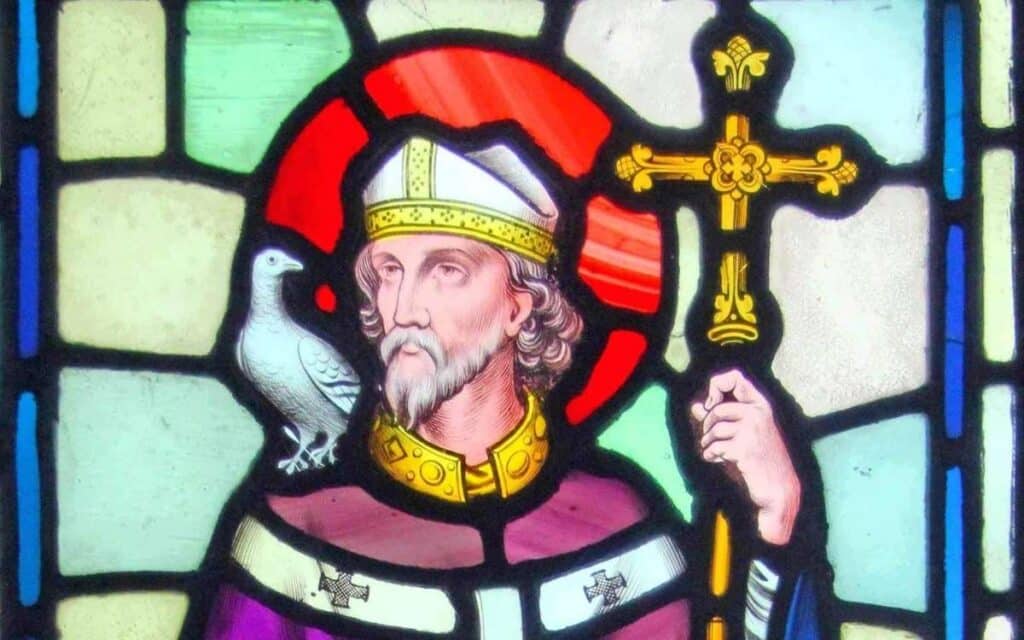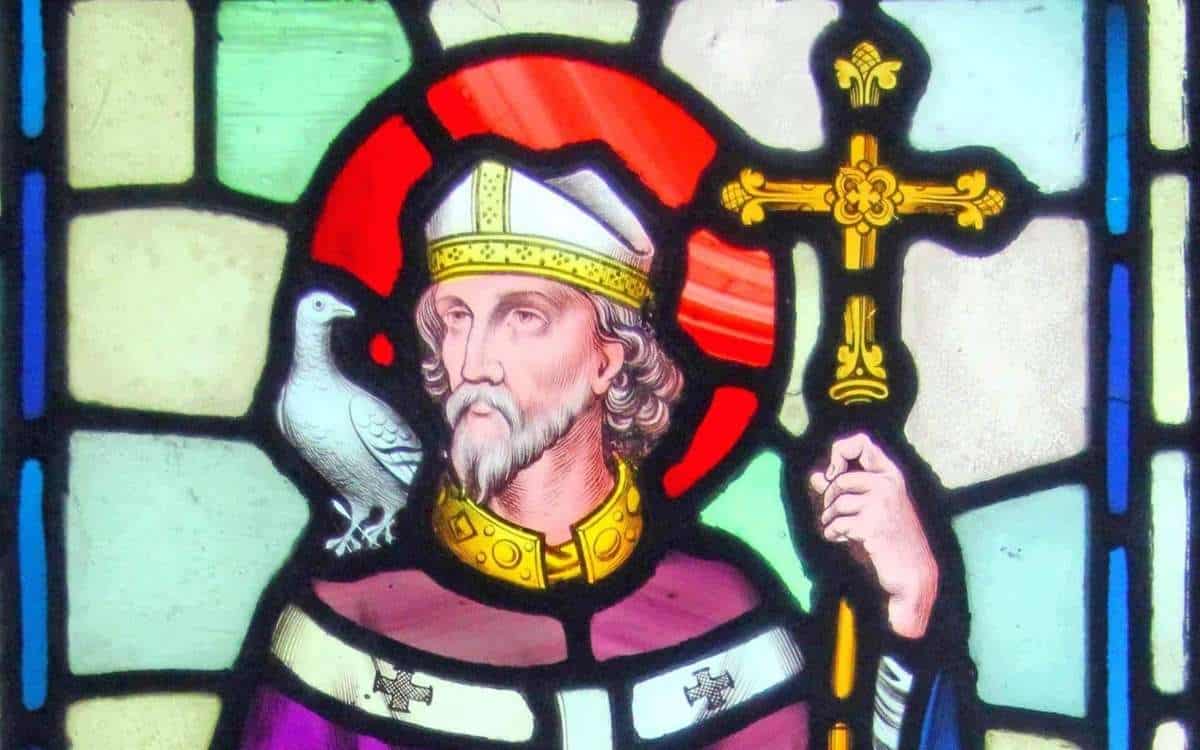It’s St David’s Day – here are 10 fascinating facts about the patron saint of Wales, from CALLUM CAMPBELL

St David, the Patron Saint of Wales, was certainly an interesting and unconventional character who lived a strict and devoted life. While this life is shrouded in mystery, what we can glean from it is worthy of interest and makes for a timely article about the man himself on his feast day.
Facts about St David
- St David followed a humble and peaceful code which prompted a calm and modest life. He lived focused much on his diet, which was said to be entirely composed of leeks and water. He shunned the consumption of meat and the use of animals in agriculture, insisting his monks plough the fields by hand. He did not permit them to indulge in frivolous things like beer or food that was not bread with salt and herbs. He also insisted that no man should own any possessions and instead share everything with his peers.
- St David possessed great power in that he was able to ask God to alter reality on his behalf. These acts of divine power are called miracles and St David performed his most impressive feat while preaching to a large crowd at Llanddewi Brefi. The swarm of people could not hear David’s voice no matter how loudly he spoke, so he called upon God and beneath his feet the ground began to bulge until David was at the peak of a hillock that had sprang like a fountain under his soles. A white dove swooped down and perched upon the saint’s shoulder as he continued his preaching, which rang throughout the land due to his increased vantage.
- At the Welsh town of Olygate, there is an old cobbled well that is reputed to cure any disease, malady or plague, no matter the severity. This well can be found on the side of an earth mound in the middle of a graveyard and was blessed by St David while it was a spring. The well was built to harness the spring’s water in 1911 and upon its opening flocks of people travelled to utilise the well’s heavenly remedy. Belief in the well’s mending magic holds strong locally to this day.
- David’s birth and childhood were heralds of the virtuous man he was fated to become. His mother, St Non, while pregnant with the unborn David, was attending a preacher’s congregation when it was found the preacher was unable to speak. This phenomena was interpreted to mean that David would grow to be a powerful preacher and wary of what this would mean for his power, a local warlord decided to butcher the baby on birth. On the day of David’s birth he amassed his troops and warriors however upon stepping outside they were bombarded by wind, rain and hail. A great storm was raging everywhere in the region except for a spot on the cliff side where St Non was giving birth to David. Her pain was so immense she left imprints upon the rocks she clutched and she eventually gave birth to one of Wale’s greatest saints.
- At the end of St David’s eventful life David’s last words were recorded as “Be joyful, keep the faith and do the little things you heard and seen me do”. These final words have given way to the widely used metaphor in Wales of “Do the little things”. This is meant to show that small acts of kindness can make a massive difference.
- Funnily enough, St David holds the mark of being the only patron saint of a country in the British Isles who is a native of that country. St Patrick, patron Saint of Ireland, was born in Scotland with Roman heritage, St George, patron Saint of England, began his life in Turkey and St Andrew, patron Saint of Scotland, was born in northern Israel, who never actually set foot in Scotland unless you count his bones.
- David was quite the medieval celebrity, preaching across Wales and England and having over 60 churches dedicated to him in Wales alone. His public preaching always brought in droves of worshippers as he was as skilled with words as Picasso was with a paintbrush. In fact, he was so well respected that Pope Callistus the Second stated that two trips to St David’s shrine was worth one trip to the Vatican, the very core of Catholicism.
- St David is integral to the leek being one of Wales’s national symbols. As well as his diet of water and leeks, his advice to Welsh soldiers preparing for a battle with Saxons hellbent on decimating Wales proved crucial in making sure the Welsh army did not slaughter their own men. By advising the Welsh to adorn their headwear with leeks he prevented casualties amongst the Welsh soldiers by their own men.
- As well as David’s most famous and awe-inspiring miracle that was mentioned earlier he committed many other acts of wonder that deserve note. Perhaps a miracle to rival his summoning a hill beneath his feet is his feat of raising a small child from the dead by splashing some tears on the deceased’s face. Some other acts include restoring a bind monk’s sight, creating a spring when his neighbours suffered from drought, eating a piece of poisoned food without any ill effects and cursing a group of assassins to lose all their strength and killing all their cattle within seconds. After they begged for forgiveness David resurrected their cattle and restored their strength.
- Despite being a virtuous and holy man, St David attracted a lot of attention from various lords and earls who thought that his preaching would weaken their base of power. In order to combat this supposed threat they resorted to heinous attempts to kill David however through divine interventions such as a messenger commanding a sea serpent to deliver him to David in order to warn him of an assassination plot. Through numerous miracles and holy power David was supposed able to live to 147 years before he passed due to old age.
One of the most influential Saints of the British Isles, St David craved his mark into the earth and serves as a reminder to live as good a life as we can. Thanks for reading and remember to do the little things in life!


